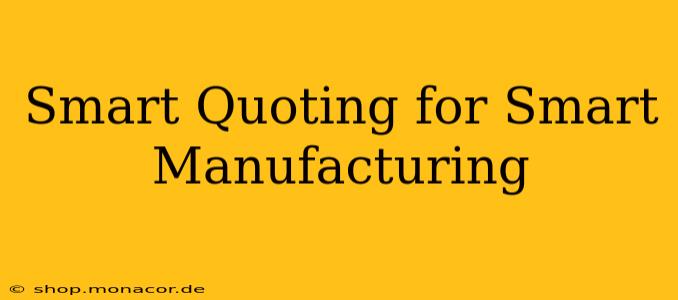Smart manufacturing is revolutionizing industries, and at the heart of this transformation lies the ability to accurately and efficiently quote projects. Smart quoting, powered by advanced technologies and data-driven insights, is no longer a luxury but a necessity for manufacturers aiming to thrive in today's competitive landscape. This comprehensive guide delves into the strategies and technologies driving this evolution, empowering businesses to optimize profitability and efficiency.
What is Smart Quoting in Smart Manufacturing?
Smart quoting transcends traditional manual quoting processes. It leverages real-time data, advanced analytics, and intelligent automation to generate accurate, competitive, and profitable quotes swiftly. This involves integrating various data sources, such as ERP systems, CRM databases, and machine learning algorithms, to create a dynamic and responsive quoting engine. The result is a streamlined process that reduces errors, accelerates turnaround times, and improves overall decision-making.
How Does Smart Quoting Improve Manufacturing Efficiency?
Smart quoting significantly enhances manufacturing efficiency by:
- Automating Repetitive Tasks: Eliminating manual data entry and calculations frees up valuable time for employees to focus on higher-value activities like customer relationship management and strategic planning.
- Reducing Errors: Automation minimizes human error, leading to more accurate quotes and fewer costly revisions. This translates to fewer delays and improved customer satisfaction.
- Improving Accuracy: Access to real-time data ensures quotes reflect current costs, material availability, and production capacity. This reduces the risk of underquoting or overquoting.
- Faster Turnaround Times: Automated processes dramatically shorten the quoting cycle, enabling manufacturers to respond to customer inquiries more quickly and secure more business.
What are the key benefits of smart quoting in manufacturing?
The key benefits extend beyond efficiency, impacting profitability directly:
- Increased Profitability: Accurate costing and pricing lead to improved profit margins. Smart quoting helps manufacturers understand their true costs and optimize pricing strategies.
- Better Customer Relationships: Faster turnaround times and accurate quotes enhance customer satisfaction, fostering stronger and more loyal relationships.
- Improved Decision-Making: Data-driven insights provide a clearer understanding of project profitability, helping manufacturers make informed decisions about which projects to pursue.
- Competitive Advantage: Manufacturers who embrace smart quoting gain a competitive edge by offering faster, more accurate, and more competitive quotes.
What Technologies Power Smart Quoting?
Several technologies are instrumental in enabling smart quoting in smart manufacturing:
- Enterprise Resource Planning (ERP) Systems: ERP systems provide a central repository of data, including production costs, material inventory, and labor rates, which are crucial for accurate quoting.
- Customer Relationship Management (CRM) Systems: CRM systems store customer information, project history, and preferences, allowing for personalized quotes and improved customer service.
- Cloud Computing: Cloud platforms offer scalability and flexibility, making it easier to manage and access data from anywhere.
- Artificial Intelligence (AI) and Machine Learning (ML): AI and ML algorithms analyze historical data to identify trends, predict costs, and optimize pricing strategies.
- Internet of Things (IoT): IoT sensors provide real-time data on production processes, enabling more accurate cost estimations.
How can I implement smart quoting in my manufacturing business?
Implementing smart quoting requires a phased approach:
- Assess Current Processes: Analyze your existing quoting process to identify pain points and areas for improvement.
- Choose the Right Technology: Select the software and technologies that best meet your needs and budget.
- Integrate Data Sources: Connect your ERP, CRM, and other data sources to create a unified data platform.
- Develop and Test Your System: Develop and thoroughly test your smart quoting system before deploying it to production.
- Train Your Employees: Provide adequate training to your employees on how to use the new system.
- Monitor and Optimize: Continuously monitor the system's performance and make adjustments as needed.
What are the challenges of implementing smart quoting?
While the benefits are significant, implementing smart quoting presents some challenges:
- Data Integration: Integrating various data sources can be complex and time-consuming.
- Cost of Implementation: Implementing new technologies and software can be expensive.
- Data Security: Protecting sensitive data is critical. Robust security measures are essential.
- Change Management: Employees may resist changes to existing processes. Effective change management strategies are necessary.
What are the different types of smart quoting software available?
The market offers a variety of smart quoting software, ranging from standalone solutions to integrated platforms. The best choice depends on specific needs and budget. Research and careful selection are crucial for successful implementation.
By embracing smart quoting, manufacturers can significantly enhance their operational efficiency, boost profitability, and gain a competitive edge in the ever-evolving landscape of smart manufacturing. The key lies in a strategic approach that carefully considers the available technologies, potential challenges, and the unique needs of the manufacturing business.

